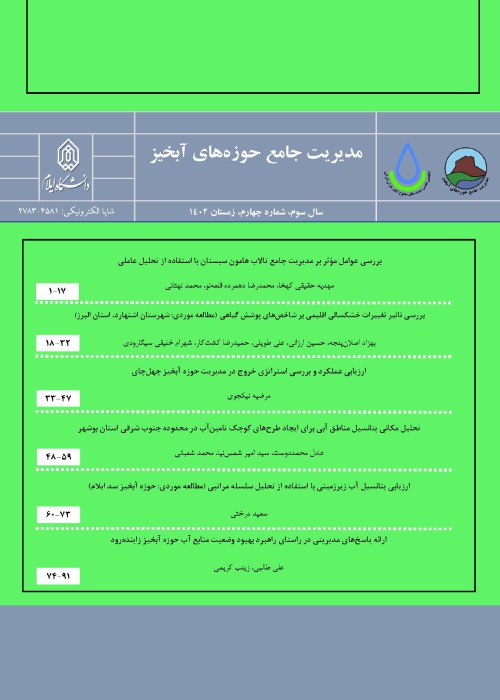An Analysis of the Consequences of Improper Exploitation of Groundwater Resources in Rural Areas of the Western Basin of Jazmourian Wetland
Groundwater is an essential resource for agriculture in all areas, including arid and semi-arid regions. It also plays an important role in the social and economic development of different regions (Savari & Amghani, 2022). Water is needed for a variety of economic activities, including energy and food production (Marston et al., 2018). In addition, it is closely related to the preservation of human generations (Singh et al., 2020). Increasing population growth in Iran as a result of land use changes and increased urban, industrial and agricultural activities has increased the use of groundwater resources so that in recent years these resources are at risk of pollution, quantitative decline and quality degradation. In recent years, due to the reduction of surface water which results from frequent and successive droughts, there has been increased pressure from farmers to exploit more groundwater through authorized and unauthorized wells, which has had many negative consequences for the agricultural and environmental sectors. Therefore, farmers and policymakers in this area need to be aware of the consequences of excessive use of groundwater to provide a comprehensive and strategic planning for safe use of groundwater. In this regard, the present study was conducted with the general purpose of an analysis of the consequences of improper exploitation of groundwater resources in rural areas of the western basin of Jazmourian Wetland.
This research is a descriptive correlational study in terms of the nature of quantitative research, according to the applied purpose, in terms of data collection. The statistical population of the study included all operators with wells (semi-deep and deep) in the area of Jazmourian wetland (N: 6112). Using Cochran's sampling formula, 153 of them were selected as a sample. To increase the validity of the findings, 185 questionnaires were distributed by random sampling method. Finally, 174 questionnaires were completed and analyzed. The main research tool was a researcher-made questionnaire which was pre-tested. The questionnaire consisted of two parts. The first part included the item related to the individual, social and economic characteristics of the exploiters, and the second part included 24 items to investigate the consequences of improper exploitation of groundwater resources in the agricultural sector. To determine the validity of the questionnaire, a panel of experts including experts in the field of agricultural extension and education of Khuzestan University of Agricultural Sciences and Natural Resources was used. Based on their opinions and suggestions, the necessary amendments were made to the questionnaire. In order to estimate the reliability of the questionnaire, Cronbach's alpha coefficient test was used. The alpha value for the outcomes section was 0.88. Since the calculated Cronbach's alpha coefficients of the questionnaire are higher than 0.7, the questionnaire has good reliability. In order to analyze the data in both descriptive and inferential sections, SPSS software was used. For this purpose, in the descriptive statistics section, frequency, percentage, mean and standard deviation were used. In the inferential statistics section, exploratory factor analysis was used.
The results of descriptive statistics showed that the mean age of the beneficiaries studied was 43.58 with a standard deviation of 11.25 years, the youngest of who was 21 years old and the oldest of who was 74 years old. Their average annual income according to the results was 7.63 million Tomans. Also, the average use of communication media among the operators under study was 2.21 with a standard deviation of 2.25 hours per day. Their average agricultural work experience was 19.82 years with a standard deviation of 11.14 years. The exploited farmers had an average of 7.50 ha of land. In order to prioritize the consequences of improper exploitation of groundwater resources in the agricultural sector in the study area, the coefficient of variation was used. Based on the respondents' views, the results showed that the most important consequences of groundwater resources in the agricultural sector in the study area included «increasing the phenomenon of poverty in the long run» and «difficult farm management» The analysis of the consequences of improper exploitation of groundwater resources in the agricultural sector was the next case of statistical analysis, for which the exploratory factor analysis method was used. KMO coefficient and Bartlett test were used to determine the suitability of the data for factor analysis. The KMO value was 0.874 and the Bartlett test value was 632.895 (p= 0.000) which indicates the suitability of the data for factor analysis. In the meantime, four factors with values higher than 1 were extracted. These four factors explained 76.846% of the total variance. 33.59% of the remaining variance was related to factors that were not identified in this analysis. According to the specific value in Table 2, the first factor had the highest share (4.69) and the last factor (fourth) had the lowest share (2.73) in explaining the total variance.
Increasing groundwater consumption in order to develop the agricultural sector combined with successive droughts has led to a sharp decline in groundwater levels. This has led to landslides and soil erosion. In the current study, some economic and social issues of landslides caused by improper use of groundwater in the western basin of Jazmourian Wetland were investigated. The results of factor analysis summarized the consequences of improper use of groundwater in four environmental, economic, social and psychological factors that could explain more than 75% of the total variance.
- حق عضویت دریافتی صرف حمایت از نشریات عضو و نگهداری، تکمیل و توسعه مگیران میشود.
- پرداخت حق اشتراک و دانلود مقالات اجازه بازنشر آن در سایر رسانههای چاپی و دیجیتال را به کاربر نمیدهد.




